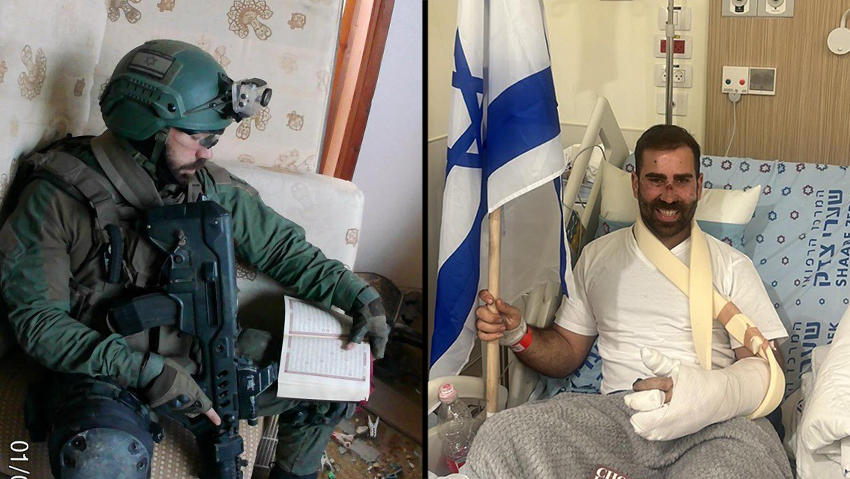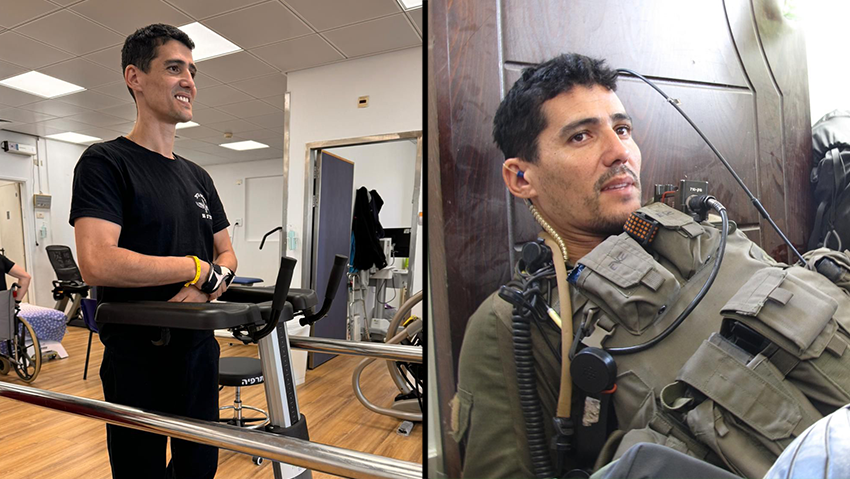Over the past six months, thousands of soldiers were injured, dramatically rescued, and have gone through life-saving treatment and rehabilitation. Two of them, Master sergeant (res.) Yinnon Ben Ami and Sergeant first class (res.) Eyal Cohen, told Ynet their journey back to life through rehabilitation at Sheba and Ichilov hospitals.
Yinnon, your injury occurred during a significant event in Khan Younis at the beginning of February. What do you remember from what happened there?
"We were in the middle of an operation inside the refugee camps in Khan Younis. During the fighting, we cleared the houses. We knew in advance that there were many terrorists, tunnels, and a lot of IEDs in the area. In one of the houses we entered, we identified a tunnel that was a bit unusual, and while we were securing the tunnel and looking for a way out to avoid exposure, everything just exploded, part of the house collapsed on us. In this event, 15 soldiers were injured, most of them from my unit, three soldiers were killed. One of them was our battalion commander, one was a platoon commander who was with us and his communications soldier.
"During the incident, the fighting continued, and what happens is that everyone understands the severity of their injury and does what they can. Whoever can fight with their personal weapon does it because all the equipment was blown away from us in the blast, and from there, an evacuation process begins."
It's been almost two months and three surgeries since the injury, how are you feeling today?
"I feel much better. The medical staff both at Soroka and here at Ichilov are simply amazing, they give their all to get us back to normal life as quickly as possible. At the moment, most of the injury remains in my hand, I have some nerve damage in my body, but I'm trying to recover. I need to get back as soon as possible, both to my home routine and to continue the fight."
Yinnon, 30, from Beit She'an, a soldier in Battalion 630, was on vacation in Turkey when the war broke out. He returned to Israel and insisted on enlisting to fight in Gaza. After his injury, his wife didn't leave his side, while simultaneously trying to run the gym they own in Beit She'an.
Despite the injury and the long recovery, he doesn't lose hope. "The spirit is already in the sky from the first moment. And I understand that everything's fine. There was an injury, it's not supposed to stop anything. We just move forward, and that's something that only strengthens us more."
"We don't have a choice but to come back to life"
Eyal Cohen, 41, from Rehovot, married and a father of four, serves in the Paratroopers Brigade in the reserves. He was also injured in Khan Younis, just after the hostage exchange cease-fire, and his injury as well as his rescue story are no less miraculous.
"I don't remember anything from the moments of evacuation, because I lost consciousness," he said. "We were supposed to see an unusual tunnel. We approached the tunnel, and then the IED exploded on us. I lost a lot of blood, my main artery was hit, I broke both legs, and fractured my thigh bone. They evacuated me directly by helicopter, immediate evacuation."
"There I vital signs and I'm lucky that there was a resourceful doctor with great determination, who saw that I was dying. So he and his colleague decided to drill into my bone to inject blood because all the other veins just collapsed. It was tough doing it in the hummer, so someone held the doctor's knees so he wouldn't move. Another injured person held the blood bag on the side, and despite all the jumps, he managed to inject the blood and save my life," he added.
That sounds like an impossible mission.
"It's a story straight out of the movies. After 47 minutes, I arrived at Soroka, and there I was sedated for several days, and after three weeks, I arrived at the rehabilitation center at Sheba."
Recovery is about starting to learn to walk again
How long have you been in rehabilitation, which is basically starting to walk again?
"Recovery is about starting to learn to walk again. I've been in the recovery process for two and a half months, three, and every day you take a step, and another step, and every day they teach you how to walk with a left leg that's injured, and how to continue with a left hand, which is also injured. Every day is a learning process, a process of training, and fortunately, we have an excellent team here, and we make gradual progress."
What tips can you give the injured soldiers starting the recovery process?
"After every workout, smile, train a bit, keep going, and know that we are in a process. We don't have a choice but to come back to life"




